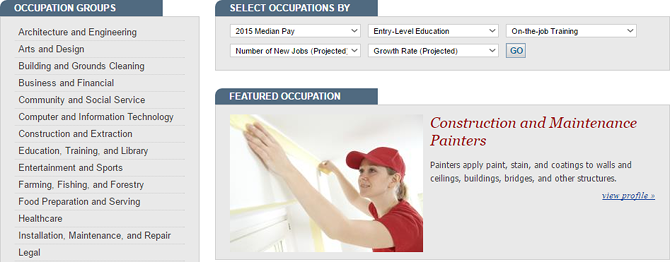I am so fortunate and grateful to be able to say "I love my job!" with a smile on my face. Not everyone can do that. In fact, in 2014, more than 50% of all working Americans were unhappy at work or otherwise unsatisfied by their jobs. Maybe you're one of them.
One common adage is that if you do what you love, then it won't be work. I don't think this is true -- despite doing what I love, hard work is still hard work. The difference is whether you can smile at the end of the day and not dread doing it again tomorrow. Dread is a prime signal that your current job is not a good fit.
So, if you're unhappy at work, know that you aren't alone! But life is too short to do something you hate (barring extenuating circumstances), so here are a few exercises you can do to find a career path that will satisfy.
1. Use a Passion-Exploration Tool
There are thousands of different career paths out there. Are you aware of every single one? Probably not. And that's the problem: your passion could very well be in one of those careers that you didn't even know existed.
You can't begin to explore your passions until you know what's out there, and that's why passion-exploration tools are the first exercise we recommend. You might know these as career assessment tests.
Some of these tests only take 10--15 minutes, while others are super-involved and require up to an hour. They'll usually warn you of the time commitment at the start, but just to be safe, set aside at least one hour before starting any of these.
With that being said, here are some good ones to try:
- WTF Should I Do with My Life? -- This "test" is extremely easy yet informative. It starts with a random idea generator ("You should be a drummer") and you can click Okay! or Hell No! If you reject, you'll keep getting random ideas. Once you accept, you'll get advice on what that career entails, how to pursue that career, what kind of pay to expect, common challenges, and more.
- MyPlan Career Assessment Test -- MyPlan offers four different PhD-designed career assessment tests, but only the Values Assessment is free. You can unlock the other three for $20 if you want, but the Values Assessment is enough to find careers that line up with your personal values and motivations.
- O*NET Interest Profiler -- As the name implies, the Interest Profiler gathers information on your personal interests and then recommends coinciding career paths that might fit well. It's a 60-question quiz where each answer is an answer from 1--5 based on how much you like or dislike a certain interest. Very easy and insightful.
- Holland Code Career Test -- The Holland code theory of career choice, sometimes called the RIASEC system, proposes that there are six abstract categories that all careers fall under: building, thinking, creating, helping, persuading, and organizing. This 80-question quiz will show you which abstract categories fit you best.
- Sokanu Career Test -- The Sokanu test matches career paths based on five separate factors: interest, personality, work environment, history & goals, and competitiveness. Based on your responses to the test, you'll get a list of best-fit careers to explore. For $30, you get Premium reports that shed more light on why certain careers may be better for you.
2. Sort Through a Career List
Depending on which passion-exploration tools you used above, you may have only gotten a general idea of which careers to explore. For example, maybe you learned that you're better suited for "thinking" jobs or "techy" jobs, but nothing more specific than that.
Now it's time to pull up your sleeves and begin sifting through and exploring individual careers.
For this, I point you to the Occupational Outlook Handbook by the Bureau of Labor Statistics. This is the most in-depth and comprehensive source of career-related information you'll ever find.
Start on the left side, under Occupation Groups. For each group that appeals to you in some way, right-click and open in a new tab. Once you reach the end and have opened several tabs, go through each group's list of occupations. You'll find job descriptions, entry-level education requirements, and median pay details.
Or you can use the search engine, which lets you search for careers based on median pay range, entry-level education requirements, how much prior training you need, the size of the job market, and how fast the job market is expected to grow.
Either way, it's a great way to research and find jobs that appeal to you but you never knew about.
If you still don't have an idea of where to begin, consider starting with this year's best-paying tech careers. Note that there are plenty of techy jobs that don't involve coding! And if you want to avoid workaholism, check out these techy jobs with great work-life balance.
3. Talk with Other People
Talking with others can be a double-edged sword. So, approach it in the right way. Go at it the wrong way and you might just end up on a worse path than you're on now!
Never ask: "What do you think I should do?"
Instead, ask: "How are you liking your career?"
Also, ask: "If you could do something else, what would it be?"
Nobody knows you better than yourself, so the people around you can't tell you what to do -- but they can provide a lot of insight into their current careers, and you can use that insight to judge if that career might be good for you.
Think of it as an informal interview. The goal is to pull you closer or push you away from their career -- just remember that both are successes. If talking to an accountant makes you realize that you'd love doing that, great! And if talking to a nurse makes you second guess, then that's good too. You don't want to waste money and energy on a career path that you might hate, right?
Truth is, a lot of jobs that seem glamorous on the surface are far from it. These interviews are important so you know what you're getting into, especially if you're eyeing a job in the tech realm.
What if you don't have people to interview? Hop over to LinkedIn, where you can connect with people from all kinds of careers. Not everyone will give you their time, but some will! If you've never used LinkedIn before, start with these tips.
4. "What Would I Do If..."
Let's say you've come this far and still have no idea what to do. Or maybe you have several different options before you and you just can't decide. I've been there before, and this is the exercise that helped me get to the next step.
Imagine everything in your life is taken care of. Your debts are paid, you're in a good financial position, your family is healthy and your kids have grown up and are living on their own. If it helps, let's say that you've been retired for one year -- take money out of the equation, you've traveled the world, and you have very few responsibilities.
What would you do to fill your day? Now that you've "finished" the hard parts of life, what are you going to do next?
For me, I know I would keep writing. For you, maybe you'd fill your time with a crafty skill like woodworking. Or maybe you'd spend all your time on a creative hobby, like gardening or photography.
No matter what it is, there's always a way to make money with it. Some will be harder than others, of course, but that just means you'll need to get a little creative to find out where the money will come from.
Here's a helpful exercise for that: Grab 15 index cards. On each card, write down an activity that you'd enjoy doing even if you weren't paid for it, or an activity that you think you're strong at. When you're done, mix and match the different cards. You'll be surprised at what you find in the intersections.
For example, if you like "rock climbing" and "filmmaking", maybe you can create a successful YouTube channel that leverages those passions into instructional or entertaining videos. Or what about "photography" and "cooking"? The possibilities are endless!
Found It? Now Pursue It!
Not everyone can just quit their job and start pursuing their passions right this minute -- and that's fine. You might need a year or longer for this process of discovery and exploration. As long as you aren't hiding behind excuses, you'll be okay.
Ready to dive in and switch careers? You may find these job search engines useful, as well as these tools for seamlessly switching careers.
It's a scary and exciting prospect, but I promise you it will be worth it. No one ever found fulfillment by retreating deep into one's own comfort zone. Good luck!
Are you unhappy at work? What kinds of careers are you eyeing? Need help finding your own passions to explore? Share your struggles with us below!




